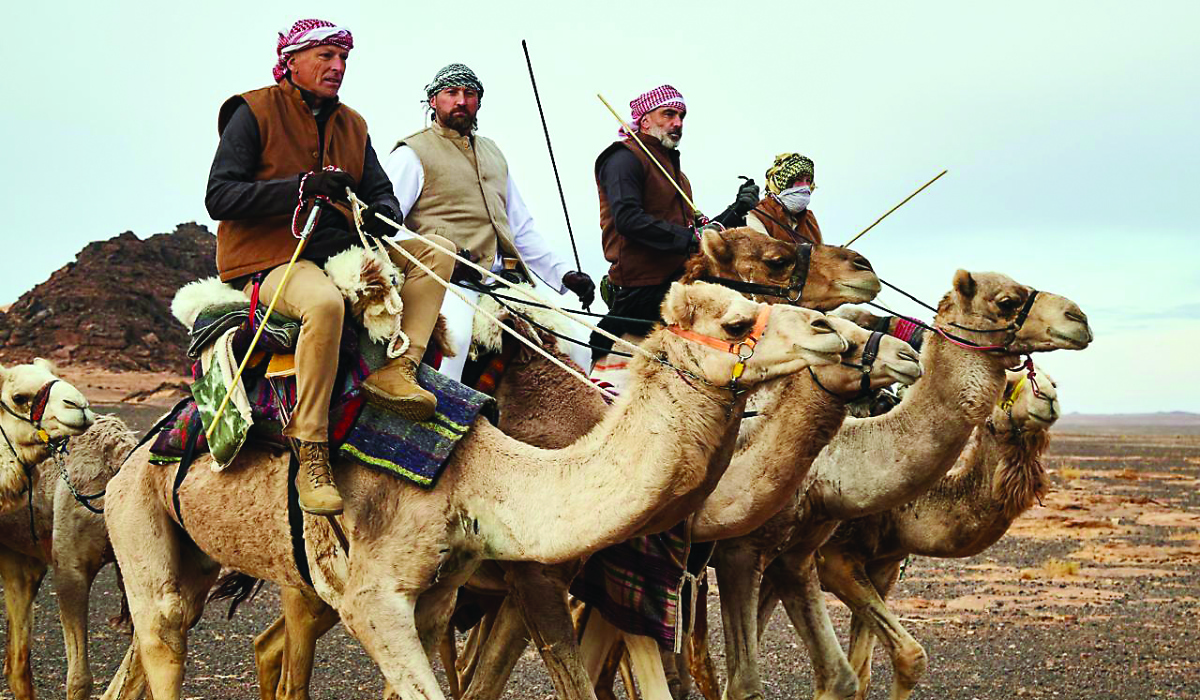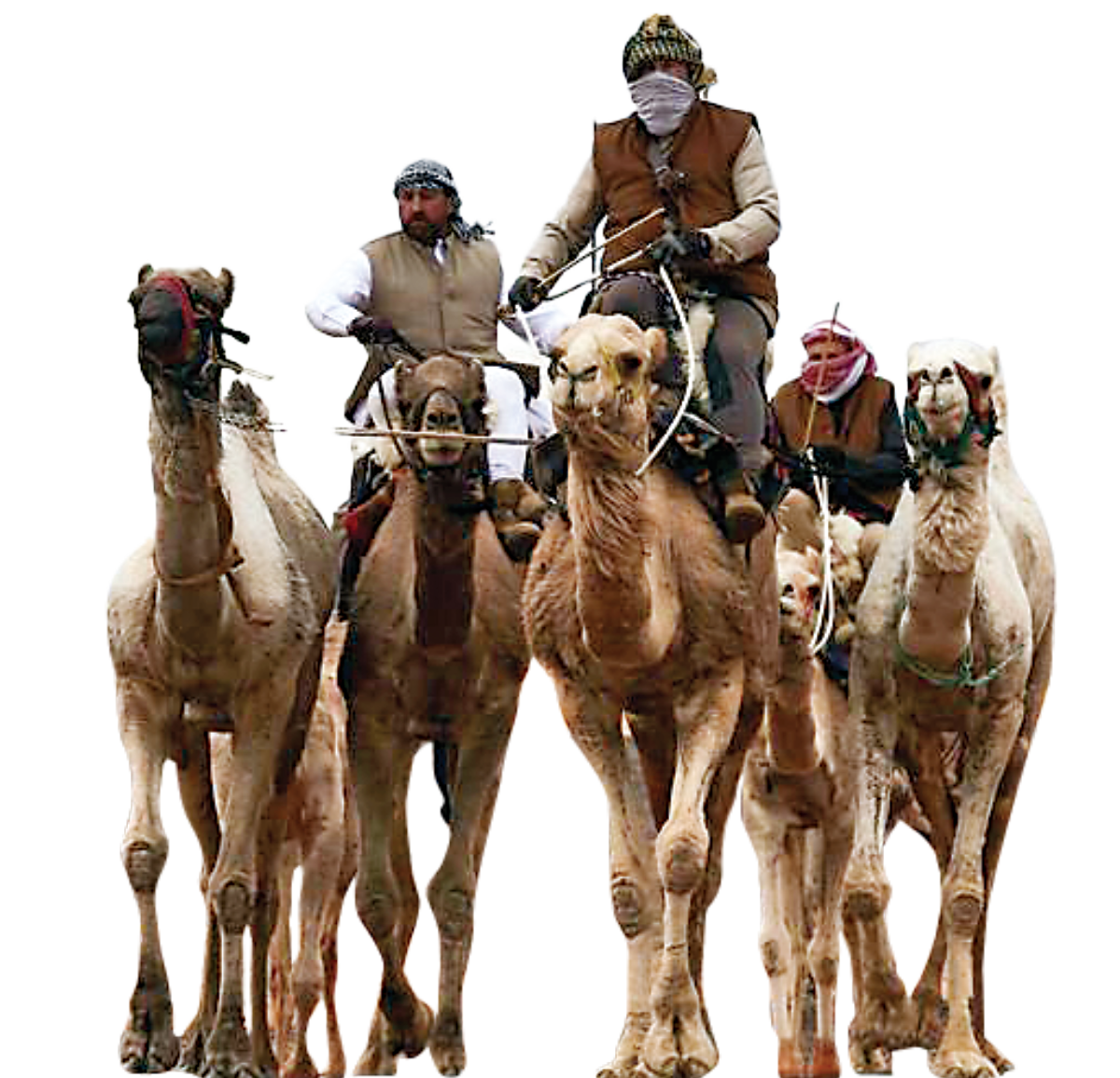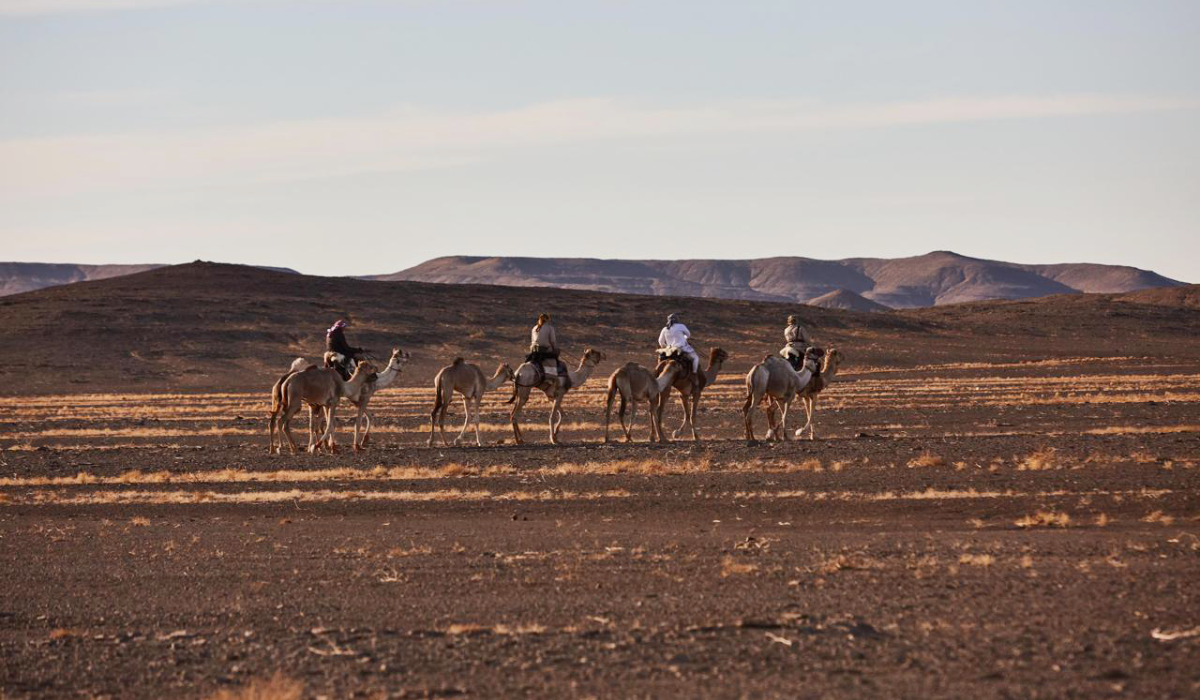JEDDAH: In a journey that followed the path of one of history’s most legendary desert crossings, a British team of four endurance riders has retraced the famous route of T.E. Lawrence, better known as Lawrence of Arabia, across Saudi Arabia and Jordan.
Their remarkable expedition, inspired by the historic trek that helped change the course of the First World War, was a feat of endurance, history and adventure.
“A few of us last year were sitting around a table and mulling what was probably the most historic camel ride in recent history, and we came up with the one from Lawrence of Arabia,” Howard Leedham, one of the riders, told Arab News. “Nobody has ever done it since Lawrence, Auda Abu Tayi, Nasib Al-Bakri and Sherif Nasir did this ride.”

Riders who trained in Tabuk during December were Martin Thompson, Riyadh resident Craig Ross, Mike Baker and James Calder, and Howard Leedham. All five riders are former British soldiers. (Supplied)
Their journey mirrored the original path taken by Lawrence and his Arab allies in 1917, beginning in Al-Wajh, Saudi Arabia, and traversing the vast desert landscapes toward Aqaba, Jordan. Along the way, the riders passed through key historical sites mentioned in Lawrence’s book, “Seven Pillars of Wisdom.”
Leedham said: “We stayed as faithful to the route as possible. We started in Al-Wajh on Jan. 14, having collected our camels from Tabuk and the LR Defenders from the Jeddah dealership … the trek took 25 days and we covered 1,100 km.”
Leedham is no stranger to extreme desert treks. “My previous experience is that I have crossed the UAE’s Empty Quarter twice on camels; each route was 640 km, which took 13 days. This was arranged by the Hamdan Heritage Center in Dubai. This is just my hobby; I run my own special situations security company serving global clients from the UAE.”
HIGHLIGHTS
• The expedition captured the true essence of the historic Lawrence route.
• Beyond the physical demands, the riders sought to reconnect with history by visiting key locations tied to Lawrence’s journey.
• The team set an ambitious target of covering 50 km a day.
The other riders who trained in Tabuk during December were Martin Thompson, Riyadh resident Craig Ross, Mike Baker and James Calder. All five riders are former British soldiers.

The team relied on modern technology to aid navigation. (Supplied)
The key historical sites they passed include Al-Wajh, A Red Sea coastal town in present-day Saudi Arabia that served as a key base for the Arab Revolt, as well as Aqaba, Wadi Rum, the Hejaz railway, Ma’an, Madinah, Wadi Bayir, Magawa Oasis and The Well of Dathna.
The expedition captured the true essence of the historic Lawrence route. The team faced tough challenges from the outset. Leedham said: “The most challenging part of the trip, to be honest, was the early days when we left Al-Wajh. We had two days transiting out of Al-Wajh toward the Hejaz Mountains and then had to climb the Hejaz Mountains in Saudi Arabia before heading up toward Fajer.”
Navigating the challenging terrain of Saudi Arabia was equally demanding. “Every single day we saw different terrain: Salt lakes, flat desert, hilly desert, volcanic formations, oasis, golden sand and red sand,” Leedham said. “The mountains in the background were so beautiful that it didn’t look real. It’s like somebody painted it.”

The expedition lasted 25 days, covering a distance of more than 1,000 km across Saudi Arabia and Jordan. (Supplied)
The team relied on modern technology to aid navigation: “We used Google Maps to plot the route in detail and then backed it up with GPS. However, we found it quite limiting due to the lack of contour information. We therefore had to pick our way through or around high ground.”
The route transited the Prince Mohammed bin Salman Royal Reserve and the King Salman bin Abdulaziz Royal Nature Reserve, which provided permits. Rangers from the reserves helped the team.
“We applied to both of those entities and asked them if we could cross their nature reserves because really, the whole time we spent in Saudi Arabia, we were in those reserves,” Leedham said. The riders witnessed the breathtaking natural beauty, rich biodiversity and deep historical significance of the two sites.

The British endurance team on camelback, traversing the rugged desert landscapes of Saudi Arabia, retracing Lawrence of Arabia’s 1917 route. (Supplied)
The team set an ambitious target. “We set out to cover 50 km a day, and we achieved that,” Leedham said.
Before nightfall, the riders would prepare to rest in anticipation of the next day’s journey.
The expedition lasted 25 days, covering a distance of more than 1,000 km across Saudi Arabia and Jordan.
“We came through the Prince Mohammed bin Salman Royal Reserve with stunning wadis and rock formations. We passed through the most beautiful oasis as well, which Lawrence actually describes in his book, ‘Seven Pillars of Wisdom.’ We saw beautiful red stone, beautiful greenery, birds singing, which is all fantastic,” Leedham said.
Beyond the physical demands, the riders sought to reconnect with history by visiting key locations tied to Lawrence’s journey. “We tried to visit all the places that Lawrence mentions in his book, like the Well of Dathna, the oasis as we got over the Hejaz and Wadi Saham.”
After crossing the Nefud plain to Fajr, the riders continued northeast to the Meegowa Oasis.
From there, they turned northwest toward Wadi Al- Sirhan, stopped at Wadi Bayr and continued up to the Al-Hadithah border crossing into Jordan to rejoin Wadi Bayr toward Bayr Fort, Jafr, Ma’an, Wadi Rum and finally, Aqaba.
No such journey would be possible without the trusty ships of the desert. “We chose camels, and we had four riders and eight camels in Saudi. We got them from Tabuk and trained in December,” Leedham said. The camels became an integral part of the team, making the eventual parting an emotional moment. “We had to say goodbye to our Saudi camels, which was quite a sad moment because they’d done so well for us for two weeks.”
The team faced extreme conditions along the way. “We lived in tents and experienced temperatures from 37 to minus 5 degrees Celsius, as well as strong winds and sandstorms.”
Encounters with Bedouin were a crucial part of the journey. “We encountered Bedouin. We had leased our 10 Saudi camels from Bedouin, so they had some guys in our support team. Also, we would stop at Bedouin camps to ask for water for the camels, we were always made fantastically welcome by all,” Leedham said.
Finally, after many exhausting weeks of traveling through the desert, the team arrived at their destination on Friday.
Recreating Lawrence of Arabia’s epic journey was more than just an endurance challenge to the team. “It was a living tribute to history, a celebration of the vast and stunning Saudi and Jordanian landscapes, and a true bond between humans and camels,” Leedham said.






























